INTRODUCTION
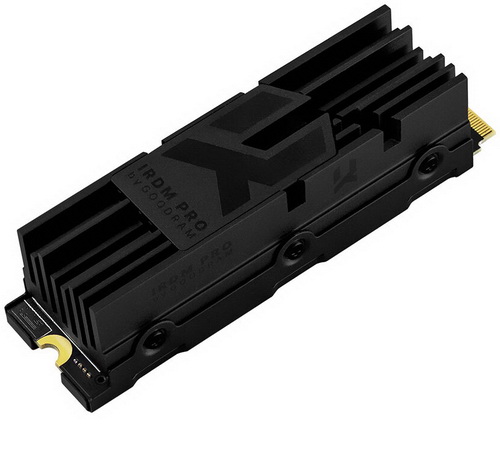
The very first PCIe 5.0 Gen 5 M.2 NVMe SSDs may be a reality (alas still in small numbers) but for the vast majority of the consumer market PCIe Gen 3 and Gen 4 models are a one way. On top of those add the very large number of SONY PlayStation 5 owners who are looking to get their hands on fast Gen 4 models to install their favourite games on (and load them from) and it's clear that the market favours Gen 4 models at this point. The good news is that there's no shortage of very fast PCIe 4.0 Gen 4 models in the market today, quite the opposite really since every single storage manufacturer has its own lineup. Still due to its size this market always has room for new players and their solutions and GOODRAM with their latest IRDM PRO line of PCIe 4.0 Gen 4 M.2 NVMe models is one of them.
GOODRAM is a brand of memory and storage products manufactured by a Polish company Wilk Elektronik. Since 2003 GOODRAM logo has been placed on removable and desktop storage and memory dedicated for consumer, enthusiasts as well as dedicated for industrial and enterprise applications. Over 30 years of marketing and manufacturing, in-house developed engineering solutions and own R&D department as well as advanced quality control procedures guarantee that GOODRAM products are innovative and reliable. GOODRAM products are available all around the world, receiving positive reviews and recommendations from both consumers and industry experts.
Just like with countless models by the competition the IRDM PRO line of PCIe 4.0 Gen 4 SSDs by GOODRAM (currently available in 1/2/4TB capacities) is based on the 8-channel (tri-core) PS5018-E18 NVMe v1.4 NAND flash controller by PHISON which they've also paired with 176-layer 3D TLC NAND flash (B47R) by Micron and 2666MHz DDR4 SDRAM by SK Hynix (2GB for the 2TB model that i have here). The PS5018-E18 NAND flash controller is probably the most popular Gen 4 model out there and of course features PHISON's 4th Gen LDPC engine (low-density parity check) along with end-to-end data path protection, wear levelling, thermal throttling (70 degrees Celsius limit), TRIM, bad block management, dynamic range SLC cache and SmartECC (RAID ECC) and fully supports AES-256bit hardware encryption and TCG Opal 2.0 and Pyrite. What separates the IRDM PRO model from other PCIe 4.0 Gen 4 models however is its bundled aluminum heatsink which should be enough to keep the drive from thermal throttling (at least under normal scenarios). Finally, GOODRAM covers the entire IRDM PRO line with a generous 5-year limited warranty and as for endurance numbers they report an MTBF (meantime between failures) of 2 million hours and a TBW of 700 for the 1TB model, 1400 for the 2TB model and 3000 for the 4TB model.
SPECIFICATIONS AND FEATURES
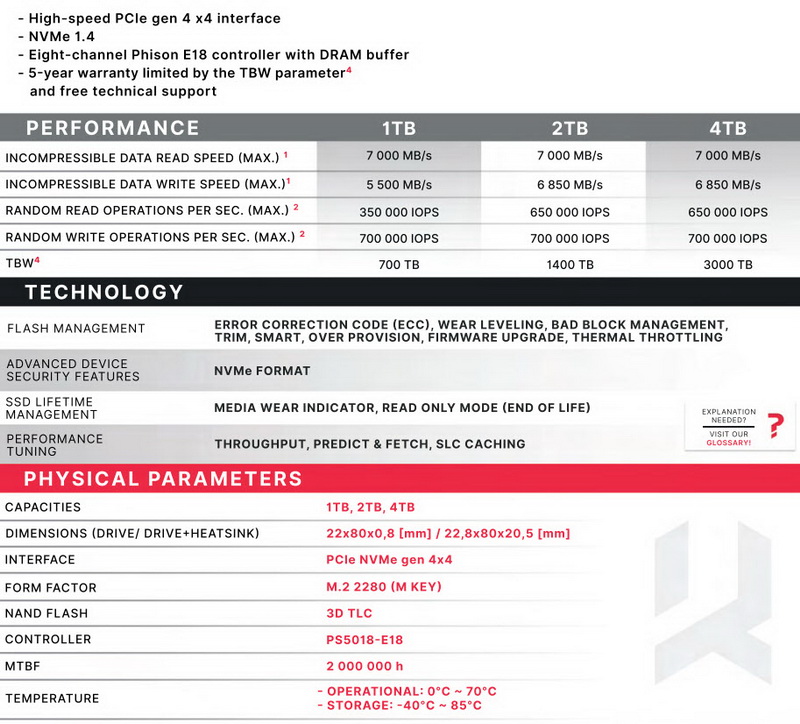
PACKAGING AND CONTENTS
GOODRAM uses a black box to ship the IRDM PRO SSD inside and typically the front is taken by their logo, a product picture, advertised performance numbers and the 5-year warranty.
The contents of the bundle are showcased on the right side.
At the rear of the box GOODRAM recommends checking the user manual and product compatibility in 20 different languages.
The bundle is placed between 3 pieces of black foam.
In terms of bundle GOODRAM certainly stands out since along with the IRDM PRO PCIe 4.0 M.2 NVMe SSD and its aluminum heatsink with its screws they also pack a screwdriver, 5 stickers, thank you paper and of course the installation instructions.
THE IRDM PRO 2TB
The IRDM PRO 2TB M.2 NVMe SSD by GOODRAM follows the typical dual side M.2 2280 (80mm in length and 22mm in width) design.
Underneath the sticker at the top, we find the PS5018 NAND flash controller by PHISON together with 4 NAND flash modules by Micron (B47R) and a single 1GB DDR4 SDRAM module by SK Hynix.
Turning the drive over we find yet another sticker underneath which we find 4 more NAND flash modules and a second 1GB DDR4 SDRAM module.
Here you can see just how the drive looks with the aluminum heatsink on it.
TEST BED
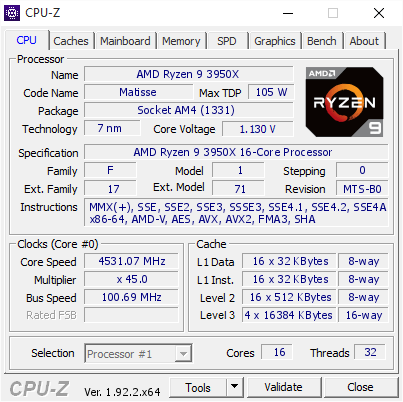

TESTING METHODOLOGY
Not long after I first started testing SSDs back in 2008, I concluded that it's almost impossible for any single benchmark suite to accurately measure their performance and that's why in certain benchmark suites we see amazing read/write performance numbers with some drives while in others things are quite different. The reason behind this is that some benchmarking suites are configured to read and write random chunks of data while others read and write constant (sequential) ones. So that's why i always use a very wide selection of benchmarking suites including AIDA64, HD Tach RW, HD Tune Pro, Crystal Disk Mark, Sisoftware Sandra Pro, AS SSD, IOmeter and ATTO. To get the most accurate results each test gets repeated a total of 6 times with the average performance numbers recorded into the charts*/****. Also, as of February 25th 2015 our results will also include the Storage Networking Industry Association’s (SNIA) IOMeter tests. These tests include a 12 Hour write test used to “simulate” performance degradation over time and a mixed workload test which basically shows what you can expect when using an SSD continuously for roughly two hours. Unfortunately, due to the time required for these tests they get repeated a total of 3 times and not 6 as the above.
Many people have made inquiries about our charts in the past so once again please do keep in mind that the Charts have the average performance numbers of each drive recorded and not the peak (highest) ones. Also, although every single one of these programs can help potential buyers choose the right drive for their needs you should also remember that from any kind of benchmark up to real world usage the gap is not small (and usually most differences will go unnoticed by most people). All tests were performed in a fresh Windows 10 Pro x64 installation complete with every update up to the date of this review.
* Since November 2018 the SSD comparison charts have been divided to 2.5” and M.2 models to reduce their growing size.
** Unless stated otherwise the Ryzen 9 3950x based Test Rig used for M.2 Gen 4 SSD reviews is not located in the lab.
*** As of January 2021 for Gen 3x4 models I’ll be using the Core i9-7980XE test rig (after numerous tests the up to 6% difference in read & write performance compared to the i7-6700 system simply wasn’t enough to justify having an extra test rig around).
**** Since February 2022 M.2 NVMe Gen3 and Gen4 SSD drives are placed in different charts.
TEST RESULTS - AIDA64 / ATTO
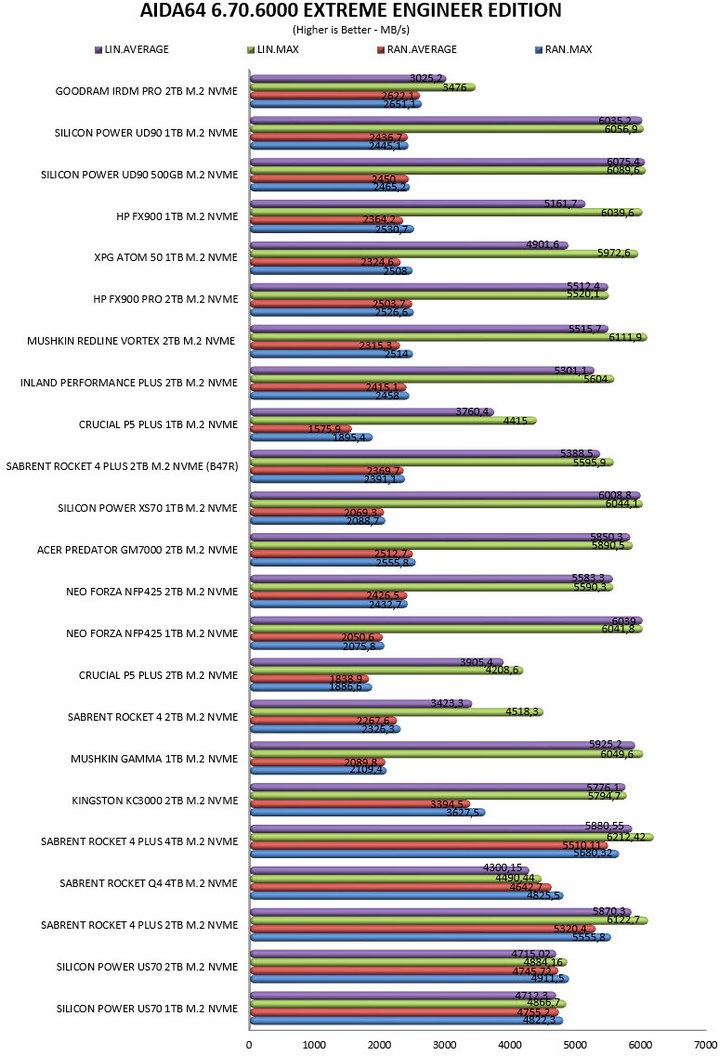

TEST RESULTS - HD TACH RW / HD TUNE PRO
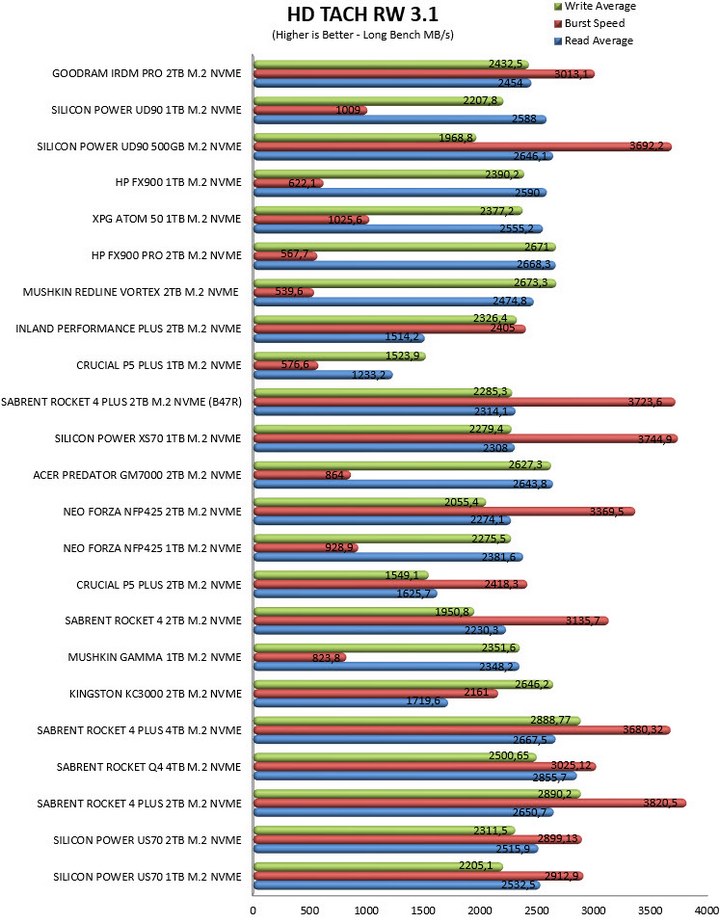
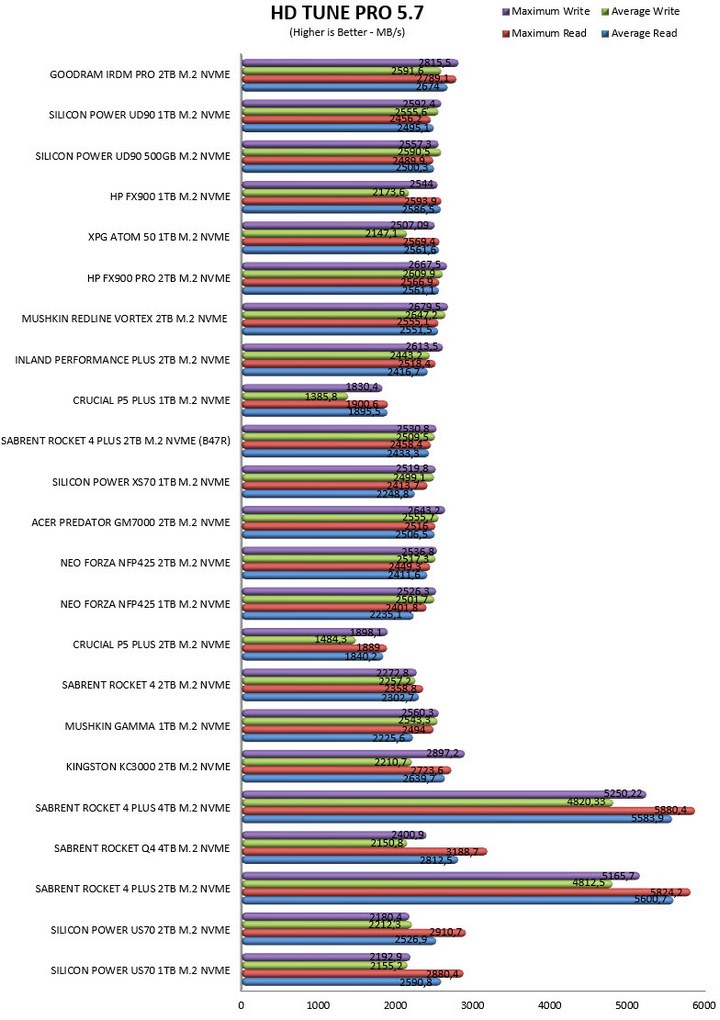
TEST RESULTS - SISOFTWARE SANDRA PRO / CRYSTAL DISK MARK
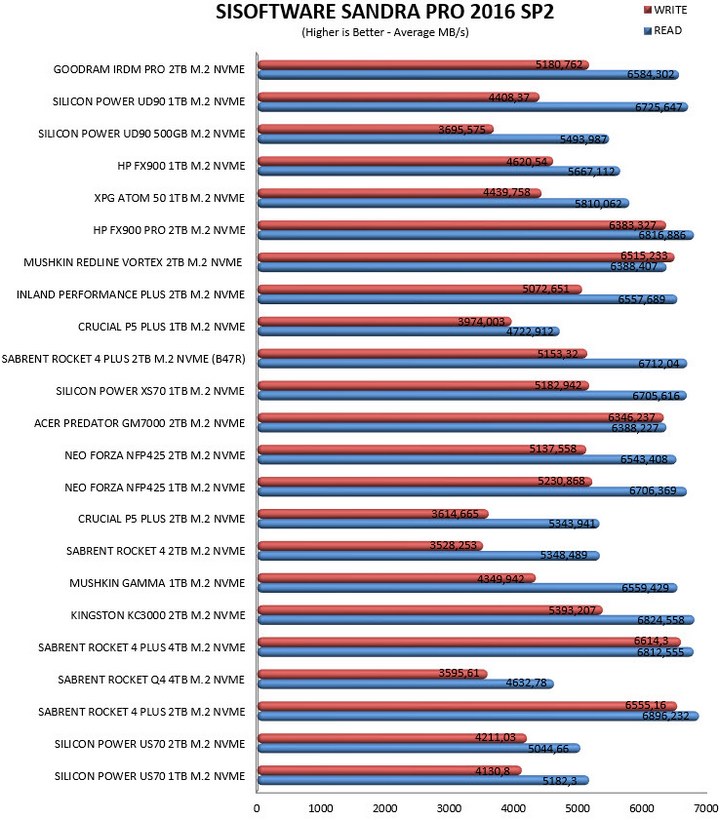

TEST RESULTS - AS SSD / IOMETER

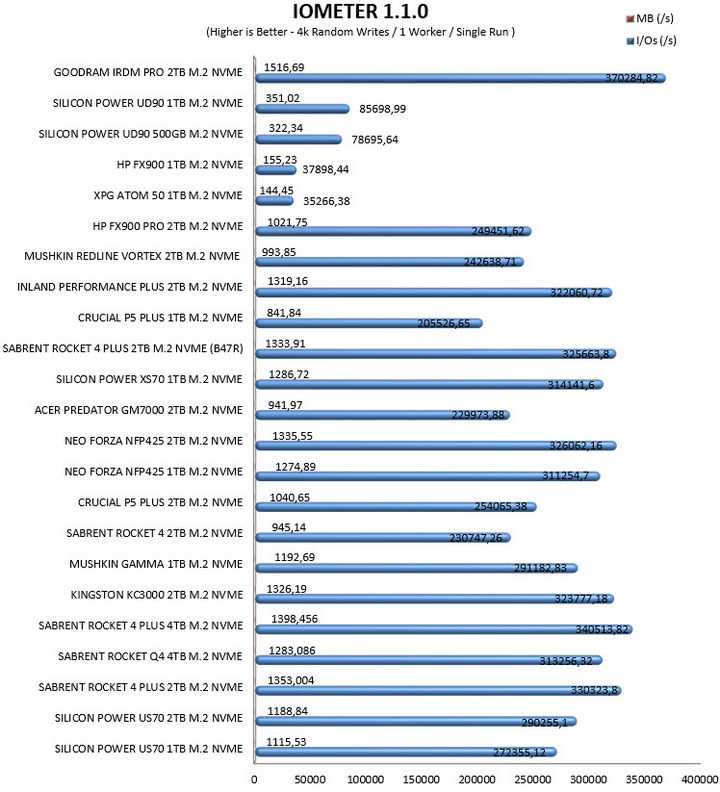
TEST RESULTS - IOMETER SNIA

CONCLUSION
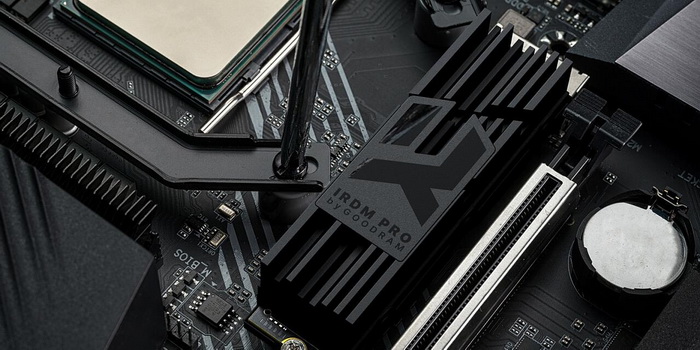
High-performance PCIe 4.0 Gen 4 M.2 NVMe SSDs based on the PHISON PS5018 NAND flash controller (E18) have been around for quite sometime now (even those paired with Micron’s B47R NAND flash) but I’ve yet to see one by a rather new player like GOODRAM. On top of that thanks to the aluminum heatsink which allows it to keep going with almost no thermal throttling (just in my 12 hour benchmark this occurred and in a small degree compared to other models) the IRDM PRO 2TB does extremely well in my tests and is clearly among the 4 fastest Gen 4 models in the charts. Durability numbers are also very good and actually even better compared to similar models, probably also due to the aluminum heatsink. What remain for a successful product are price and availability so let’s see if GOODRAM has a potential best-seller in their hands.
Even though the GOODRAM IRDM PRO 2TB PCIe 4.0 Gen 4 M.2 NVMe SSD currently retails for roughly 340Euros inside the EU (thus is priced more or less ok compared to similar models) availability even there is low (USA availability from what I see is none). This basically is the sole drawback of the IRDM PRO PCIe 4.0 Gen 4 line and so I honestly hope GOODRAM can take all the necessary steps to resolve this (if it’s too late for this gen then for the next). Availability aside however the IRDM PRO 2TB PCIe 4.0 Gen 4 M.2 NVMe more than delivers on both performance and durability and for that it clearly deserves the Golden Award.

PROS
- Top of The Charts Performance (7000MB/s Read & 6850MB/s Write)
- Endurance (1400TBW / 2 Million Hours MTBF)
- 5 Year Limited Warranty
- Limited Thermal Throttling (Aluminum Heatsink)
CONS
- Overall Availability

 O-Sense
O-Sense





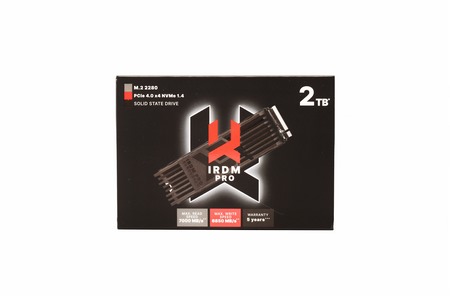
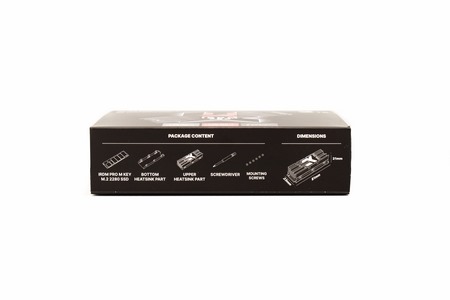
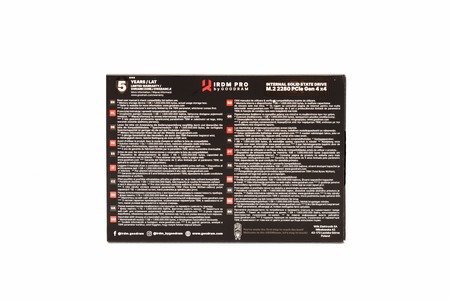
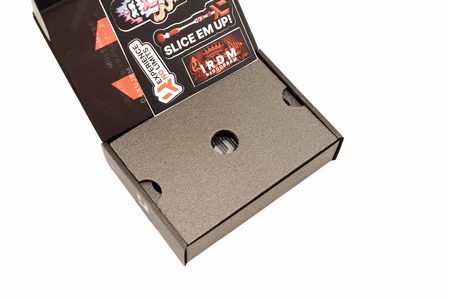
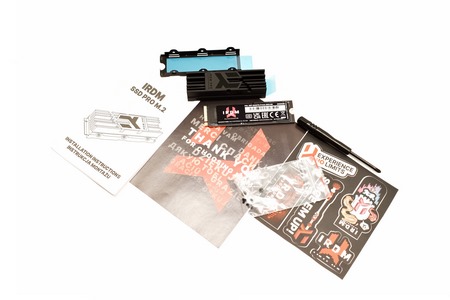


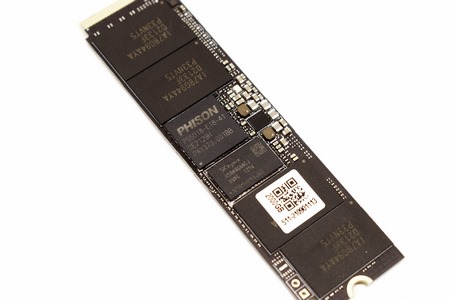

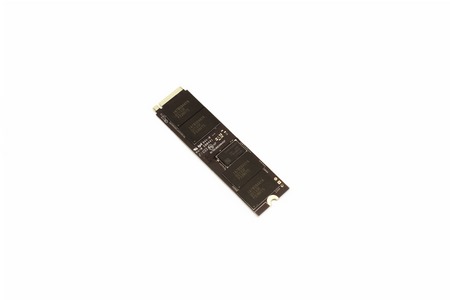






.png)

